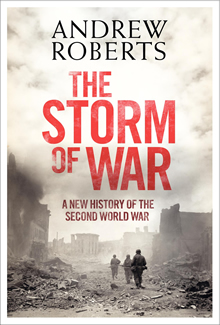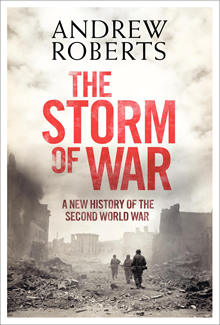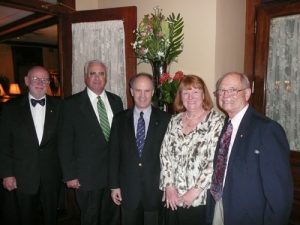
Bulletin #37 - Jul 2011
CB Talks to Historian Andrew Roberts, Author of “The Storm of War”

July 7, 2011
July 2011
Churchill Centre Executive Director Lee Pollock recently spoke with prominent British historian Dr. Andrew Roberts whose new history of World War II The Storm of War has just been released in the United States. Andrew is well known to Chartwell Bulletin readers for his books and articles on Sir Winston and his contemporaries, his longtime support of The Churchill Centre and his frequent participation in TCC’s International Conferences. Among his previous works are acclaimed biographies of Lord Halifax (1991) and Lord Salisbury (1999), Hitler and Churchill: Secrets of Leadership (2003), A History of the English Speaking Peoples since 1900 (2006) and Masters and Commanders: How Roosevelt, Churchill, Marshall and Alanbrooke Won the War in the West (2008).
In addition to his historical writing, Dr. Roberts is a frequent contributor to The Wall Street Journal, Commentary and other newspapers and magazines as well as a television commentator for NBC.
In this CB interview, Andrew talks about his latest books, his recent move to New York and current writing on Churchill and the Second World War.
Lee Pollock: Andrew, some of our readers are not completely familiar with your background. Could you tell us a little about where you grew up, your education and how you developed an interest in history and in Winston Churchill. Were there any Churchillians in your family who influenced you along the way? And do you recall when you first recognized Churchill’s unique role in 20th century history and in the Second World War?

2025 International Churchill Conference
Andrew Roberts: I grew up in Surrey, in Southern England and was educated at Cambridge University, from where I took a First class honours degree in History, was an honorary senior scholar and am a Doctor of Philosophy. My father read history at Oxford and it was he and my prep school history master, Christopher Perry, who first sparked a love of history in me. They too inculcated in me the central role that Sir Winston Churchill played in the Allied victory in the Second World War, and what a very great human being he was.
LP: One of your recent books on the War, Masters and Commanders, focused on the role of four key individuals in the conflict. What was your goal in writing it?
AR: I wanted to try to explain how grand strategy was arrived at by the Western Allies. Who decided where, when and how the Allied armies were going to attack, and in what strength? In the course of my researches, I discovered that the answer lay in the interaction between only four men, namely Winston Churchill, Franklin Roosevelt, the US Army Chief of Staff General George C. Marshall, and the Chief of the British Chiefs of Staff Committee, Field Marshal Sir Alan Brooke (later Lord Alanbrooke.)
LP: As you wrote that book and conducted your research, what surprised you and what did you learn that you might not have expected? Did your appreciation of these four key figures change, for better or worse, and if so, who in particular?
AR: Although I disagreed profoundly with his belief that the cross-Channel attack that later became Operation Overlord could have been attempted as early as the Fall of 1942, I found George Marshall a tremendously attractive and engaging personality, as well as being, as Churchill called him, an ‘architect of victory’, not least in the way he expanded the US Army from 200,000 in 1939 to the US having over 16 million people in uniform by 1945. The rebarbative Ulsterman Brooke was as tough a staff officer as ever sat at a negotiating table, and a fascinating figure too.
LP: About your new book, Storm of War: with the enormous amount that has already been written about World War II, what lead you to undertake the daunting task of writing a major new history now? Were there certain things you wanted to spotlight or you thought previous writers hadn’t emphasized?
AR: I wanted to investigate the extent to which Hitler’s own largely unforced errors led to the Axis defeat, and why he made them. Again and again I concluded that Hitler placed his fanatical Nazi ideology over the best strategic interests of the Wehrmacht. It was incredible how often, when the interests of his Nazism bifurcated from the best chances of winning the war, he cleaved to the former. In a sense this book is the culmination of 20 years of researching, writing and thinking about the War since my biography of The Holy Fox, so I was less daunted by the task than otherwise I might have been.
LP: As you wrote Storm of War and conducted your research, what surprised you and what did you learn that you might not have expected? Did your appreciation of some of the key figures change, for better or worse, and if so, who in particular? And why does the Second World War continue to fascinate millions of people around the world even as the “greatest generation” who fought in it is dying out?
AR: I was surprised that the wonderful Ian Sayer Archive, a repository of over 100,000 items concerning the War – diaries, letters, papers, photographs, Intelligence Reports, and so on – had never been used by any historian before. It was there that I discovered the final proof that explodes the conspiracy theory that Hitler deliberately let the British Expeditionary Force escape Dunkirk in 1940. I was astonished by what the captured German generals discussed amongst themselves when they thought they weren’t being eavesdropped upon by British Intelligence. I was astonished by so much in the book, and hope that it shows through in my prose. The Second World War will always interest people; not only did it shape the world we still live in today, but the stories of moral and physical courage are relevant to all ages.
LP: It is sometimes said that “Churchill didn’t win the War but he didn’t lose it.” Does that underestimate his contribution? Was there some possible combination of events and circumstances where neither Britain nor Germany would have been defeated and the War might have turned in a different direction?
AR: That certainly does underestimate his enormous contribution, not least in the creation of grand strategy. He had come to the ‘Mediterranean’ strategy of drawing down Axis strength into North Africa and subsequently liberating Sicily and Italy, before crossing the Channel, even before Alan Brooke arrived on the Chiefs of Staff Committee. Germany could have won the Second World War, as my latest book, THE STORM OF WAR, shows, and part of the reason it didn’t was due to Churchill’s contribution, quite apart from his keeping up of British morale.
LP: Andrew, you wrote an outstanding biography of Lord Halifax. If he had been just “Edward Wood, M.P.” in May 1940, would he have become Prime Minister? He is often portrayed in a negative light for his support of appeasement and his interest in a negotiated peace with Hitler. Is that portrayal too harsh?
AR: The portrayal of Lord Halifax is indeed too harsh, not least because he did not want to become PM in 1940, peerage or no, because he recognized Churchill’s superior claims to the post. Furthermore, his plan for pursuing the idea of peace negotiations in 1940 were explicitly not the surrender that has been made out. Our navy and ‘essential independence’ were not at risk, for example. Yet of course it was right that these avenues were not followed.
LP: President Obama recently visited London and spoke glowingly of Churchill and Roosevelt at both Buckingham Palace and Parliament – did that surprise you? With the balance of power very different than in their time or the first several decades of the post-war era, what is the status of the Anglo-American alliance? In future, will there much “special” left in the “Special Relationship”?
AR: I’ve read enough obituaries of people who’ve written the obituary of the Special Relationship to realize that it’s alive and well, even if Mr Obama is the least naturally pro-British president since the War. He said what he knew goes down well in London.
LP: Andrew, twenty years ago Churchill “revisionism” was in vogue but in the last few years, seems to have waned. How do you think this pendulum will swing back and forth in coming years?
AR: These issues will be debated so long as people speak the English language. They go to the very heart of who we are, of our national identity.
LP: You recently served as historical commentator for NBC’s coverage of the Royal Wedding. What do you think Churchill would make of the “modern” royal family and in particular of this event (and that a commoner is destined to be Queen)?
AR: He swooned over the Queen, who became queen only a few years younger than the equally lovely-looking Princess Katherine is now. I suspected he’d have swooned over Princess Katherine too. Who doesn’t?
LP: Andrew, you recently moved from London to New York. Do you plan to continue as an independent writer versus taking up a full-time academic position?
AR: I haven’t the time or patience to take up any full-time academic position, even in the unthinkable circumstances that one were offered me. I stand in awe of friends such as Niall Ferguson who are able to teach as well as write history.
LP: One of your British contemporaries, Sir David Cannadine, came to America several years ago after being selected to write the authorized biography of Andrew Mellon; when queried how a British historian came to that task, he said “They asked me”. If you had the chance to write a major biography of an American you especially admire, who would that be?
AR: Some of those ‘Wise Men’ of the 1940s are pretty incredible people: Harriman, Kennan, McCloy, Acheson, and so many others: what a stellar lineup of talent FDR and Truman were able to call upon!
LP: Lastly – and most importantly for an Englishman living in America – which way do you look when getting out of a taxi on Fifth Avenue?
AR: When Churchill was here and had his accident, Fifth Avenue was a two-way street, whereas now – and my desk looks straight out on it from across Central Park – it just runs one way, downtown, so it’s easier for me. But there’s a lot more traffic now and I suspect even worse drivers, so that doesn’t make it any less dangerous!
LP: Andrew, thank you.
AR: Thank you; may I say that love your magazine, Finest Hour, and greatly admire the work The Churchill Centre does in spreading the message around the globe.
Andrew Roberts’ The Storm of War: A New History of the Second World War (illustrated; 712 pp.) was published in May by Harper/Harper Collins Publishers. Yale University Prof. Timothy Snyder, reviewing the book in the New York Times, described it as “splendid….brilliantly clear and accessible” with “descriptions that are masterly and humane..” He notes that Dr. Roberts’ prose is “unerringly precise and stirringly vivid……it is hard to imagine a better-told military history of World War II.”
In the National Review, Andrew Stuttaford reports the book is “comprehensive and clear…..adding fresh insights for those already well versed.” He concludes that “The Storm of War” is “magisterial in tone and spirit….and close to truly definitive.” The Wall Street Journal notes “Mr. Roberts has set a high bar for future historians of mankind’s greatest bloodbath….the book elegantly balances fact, thought and fresh, clear prose.”
Andrew Roberts’ website, which includes information on Storm of War and his other books can be found here.
Subscribe
WANT MORE?
Get the Churchill Bulletin delivered to your inbox once a month.




